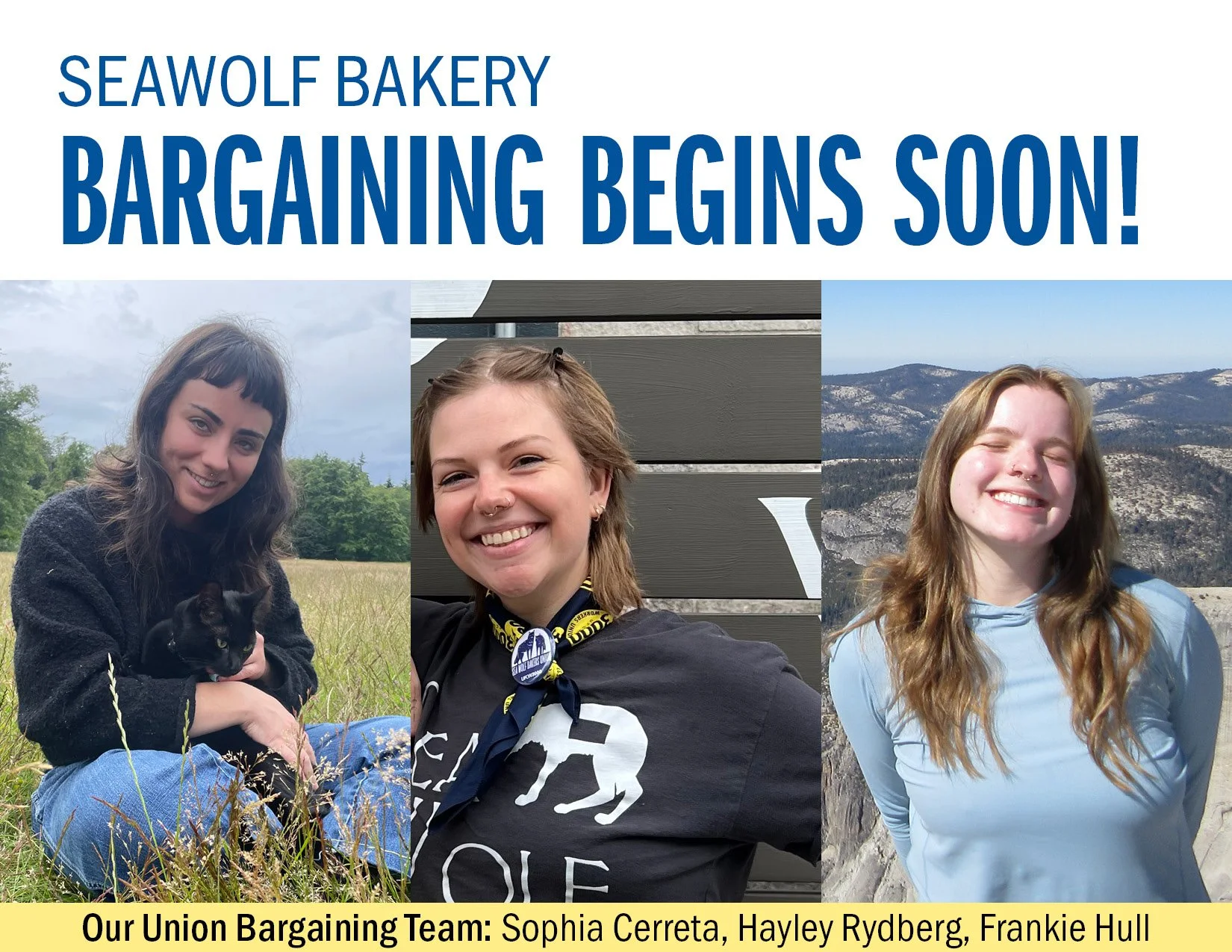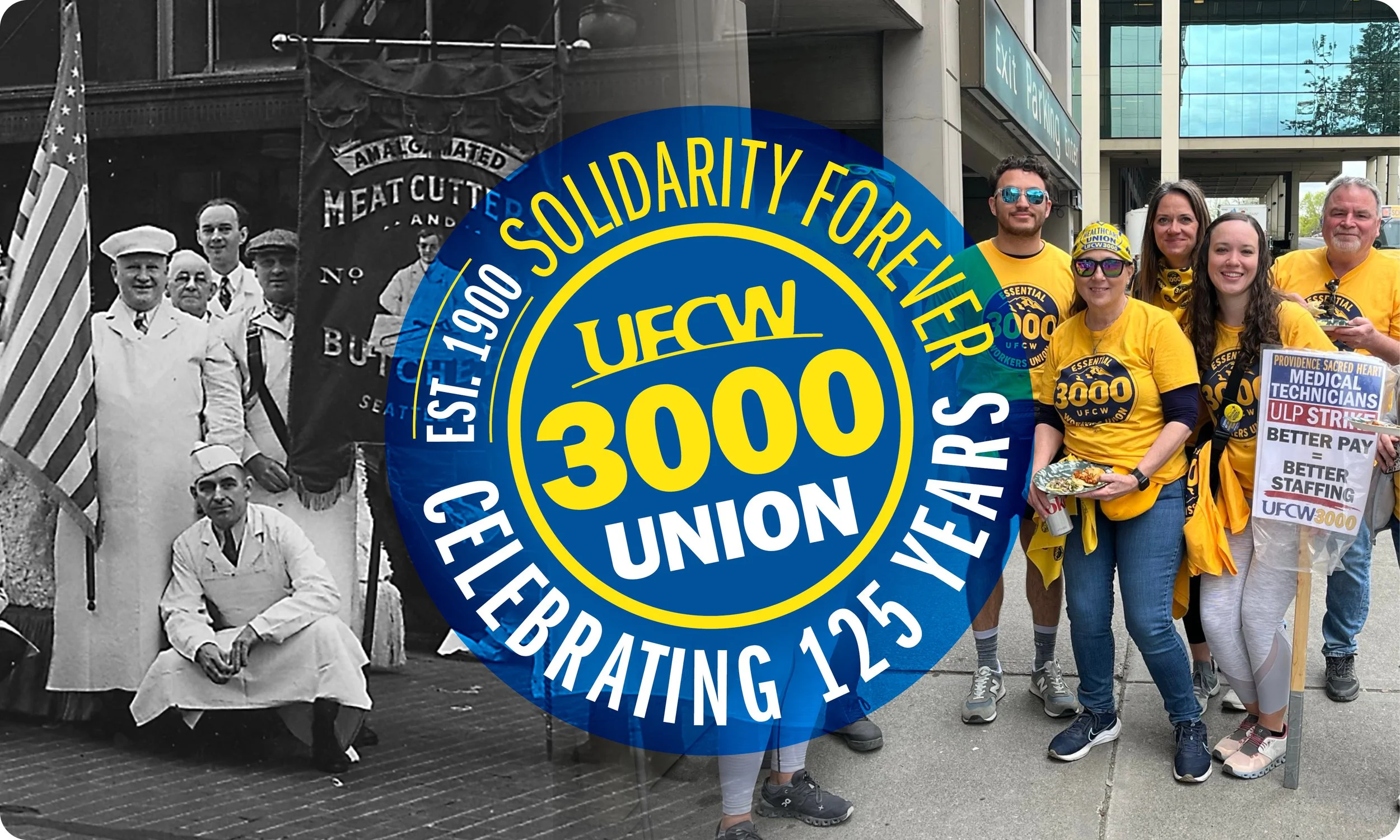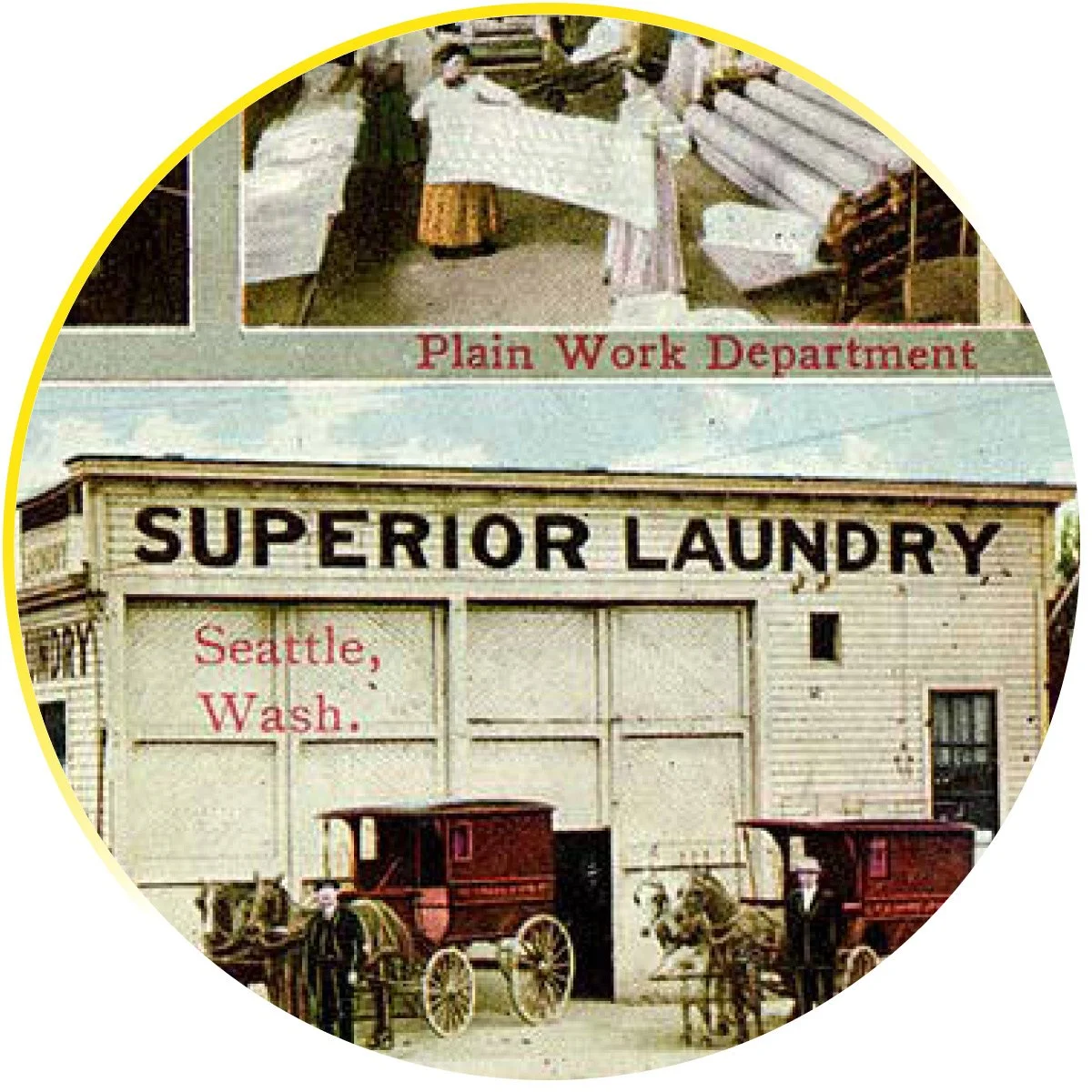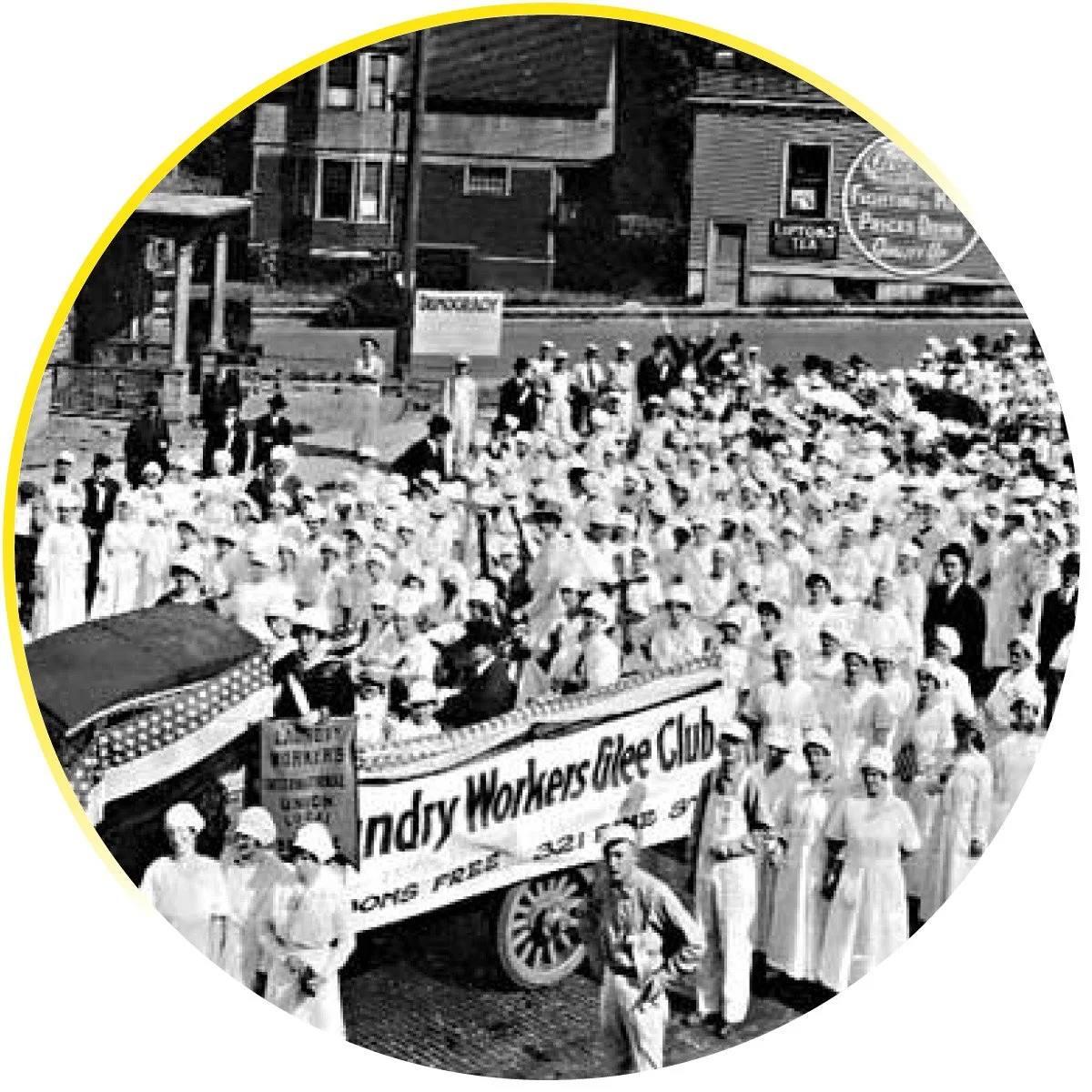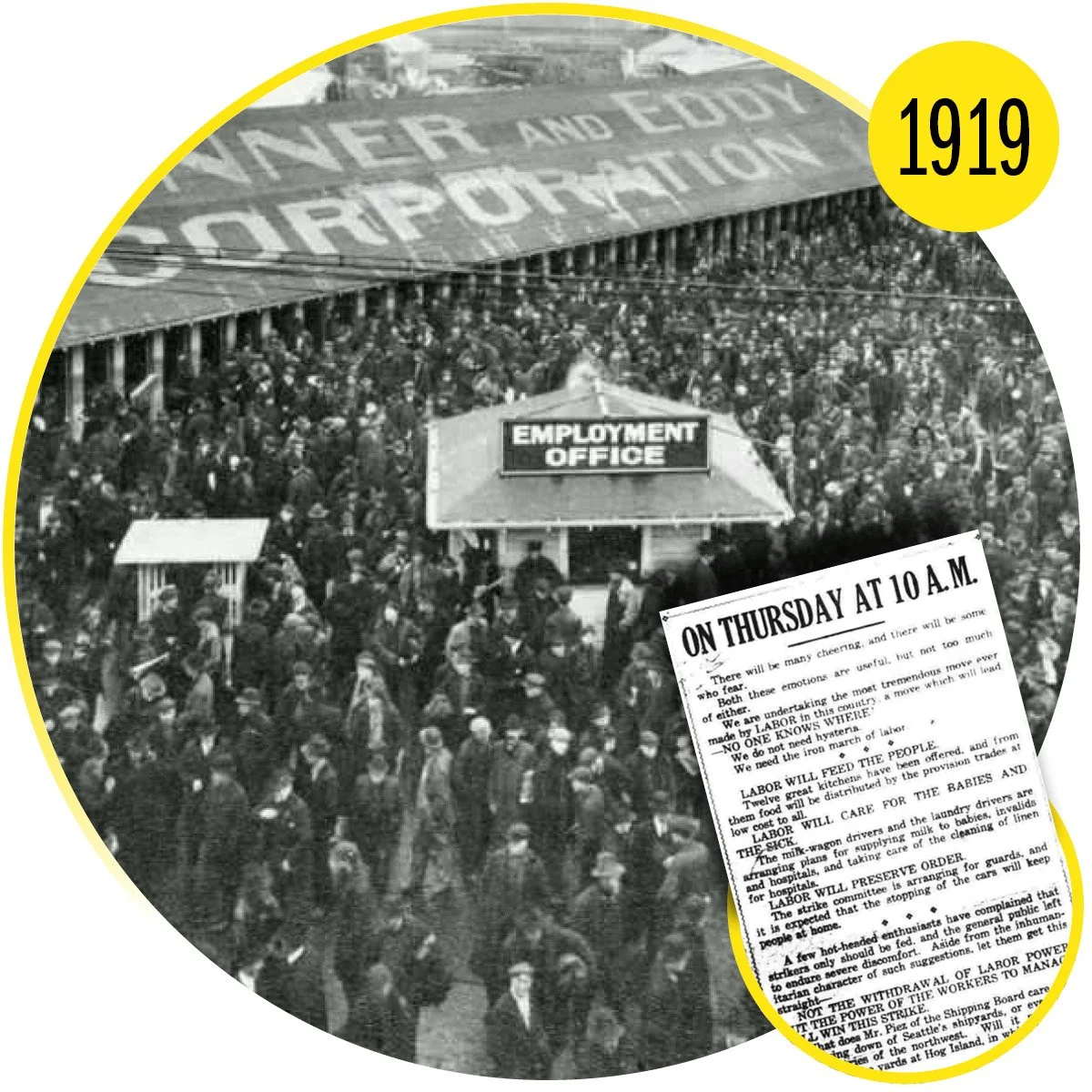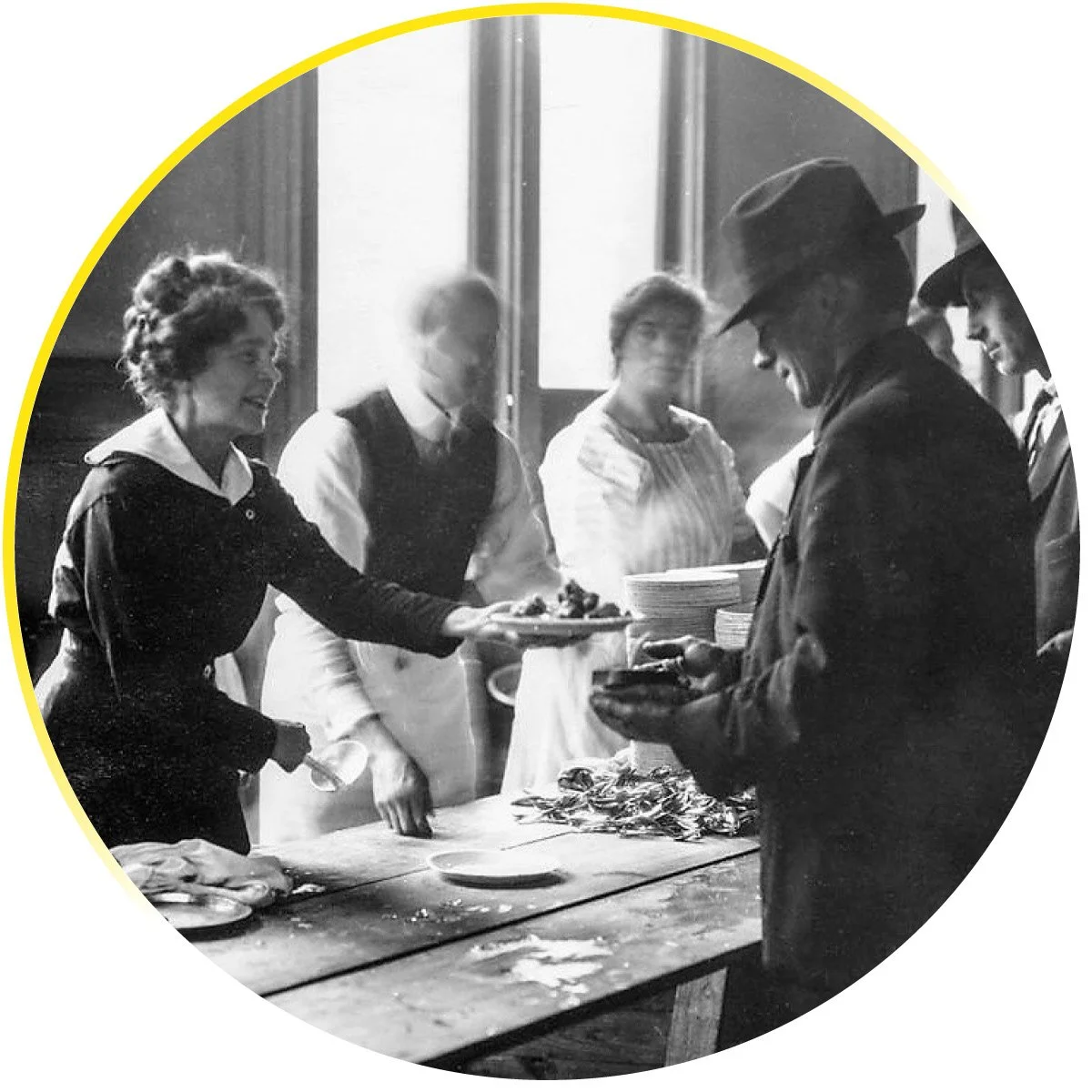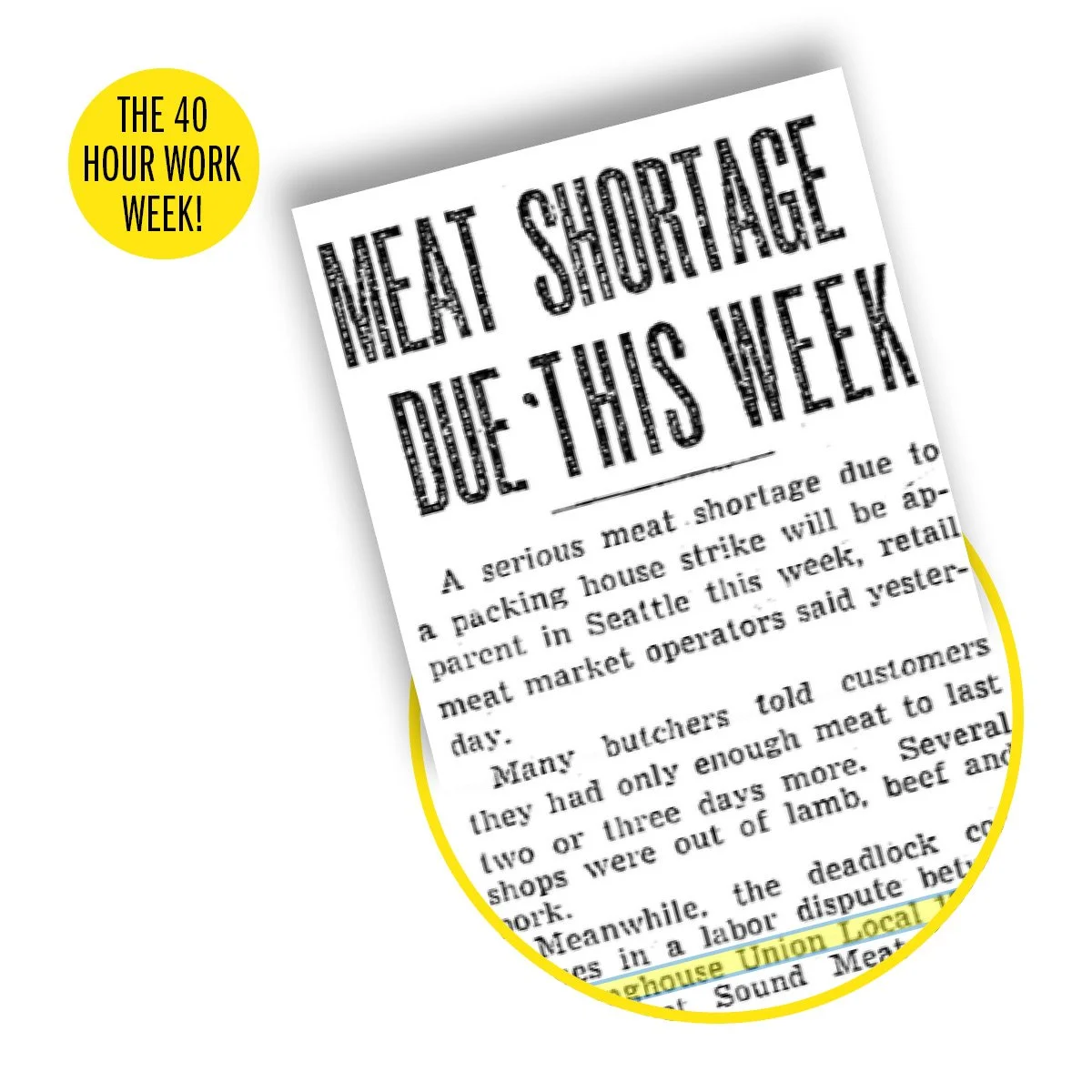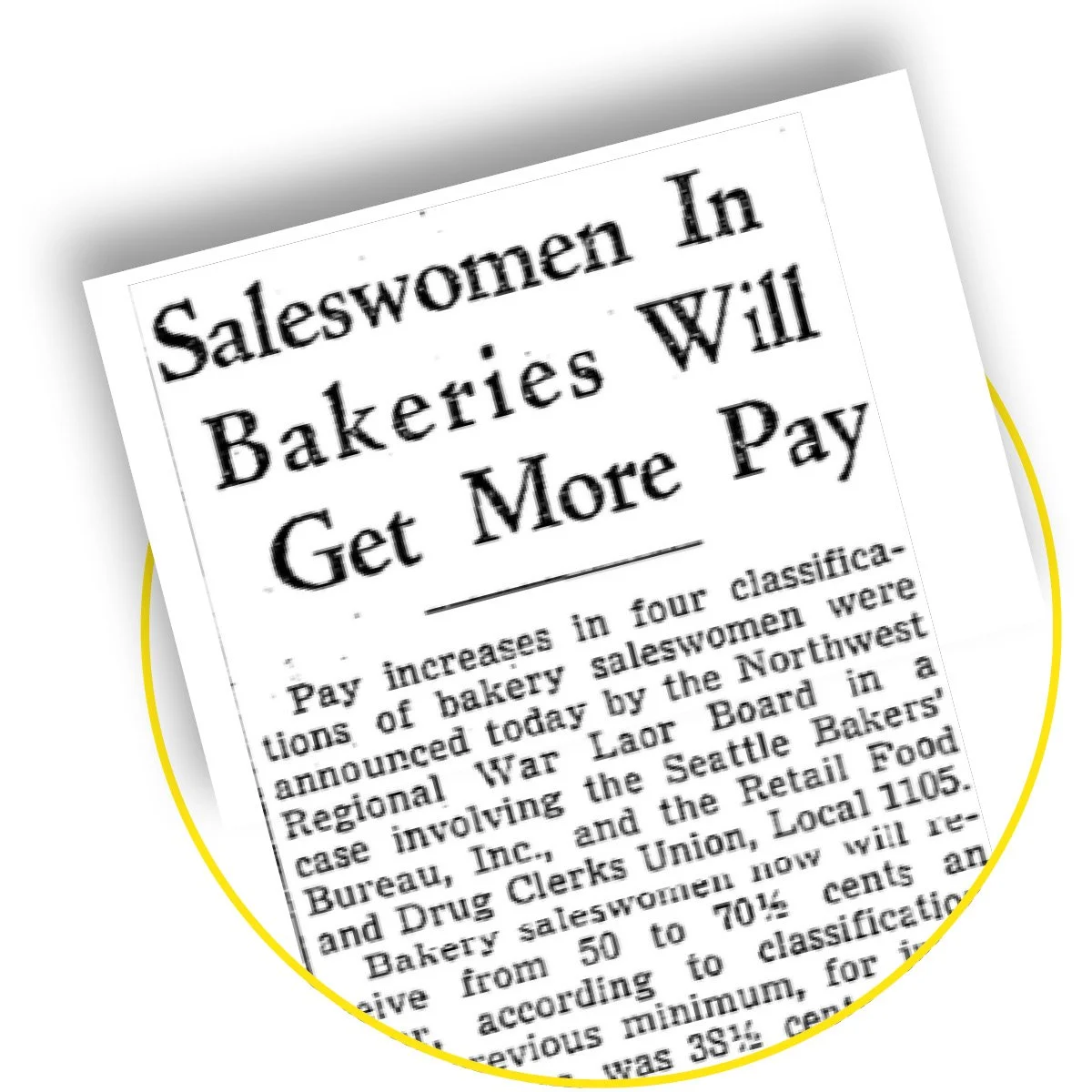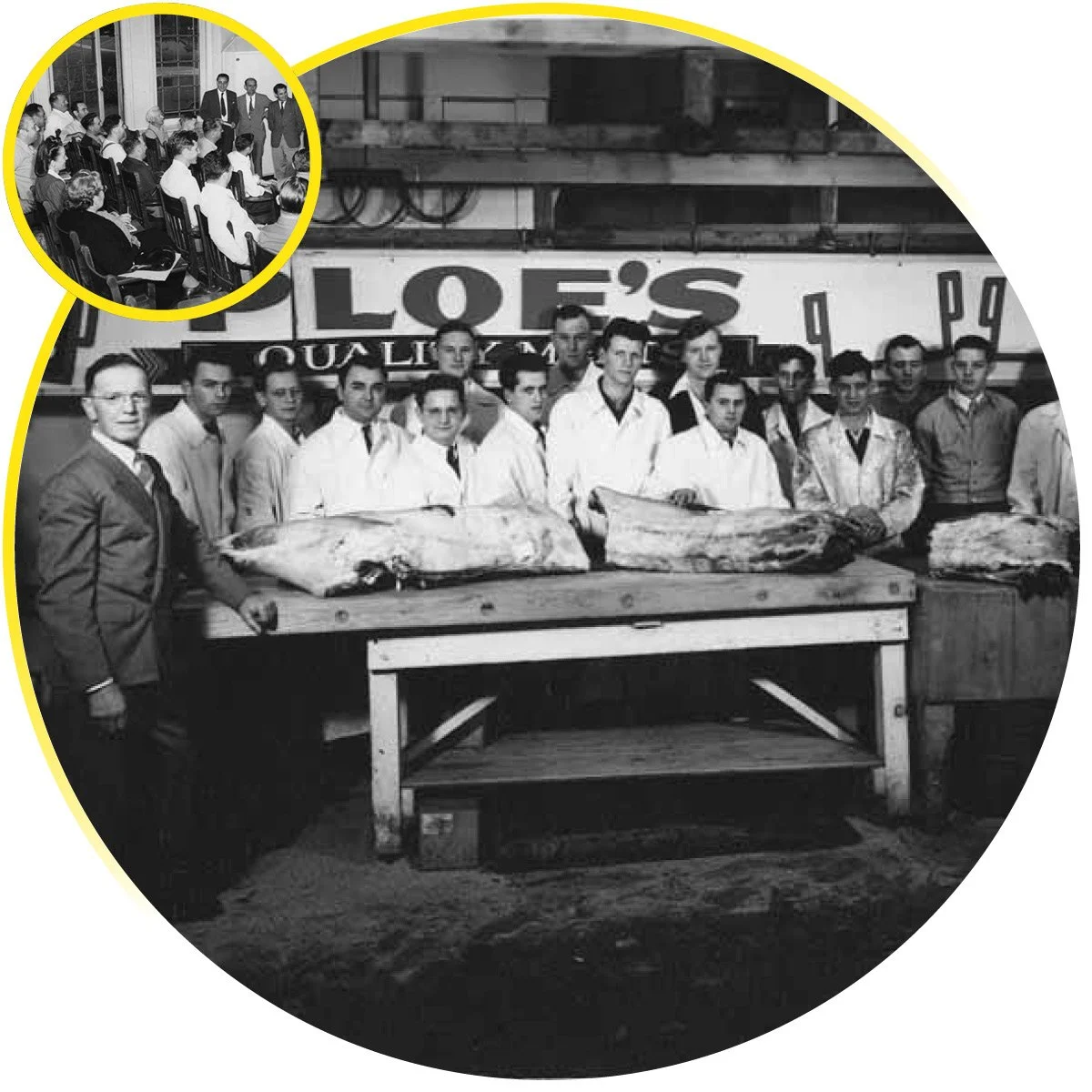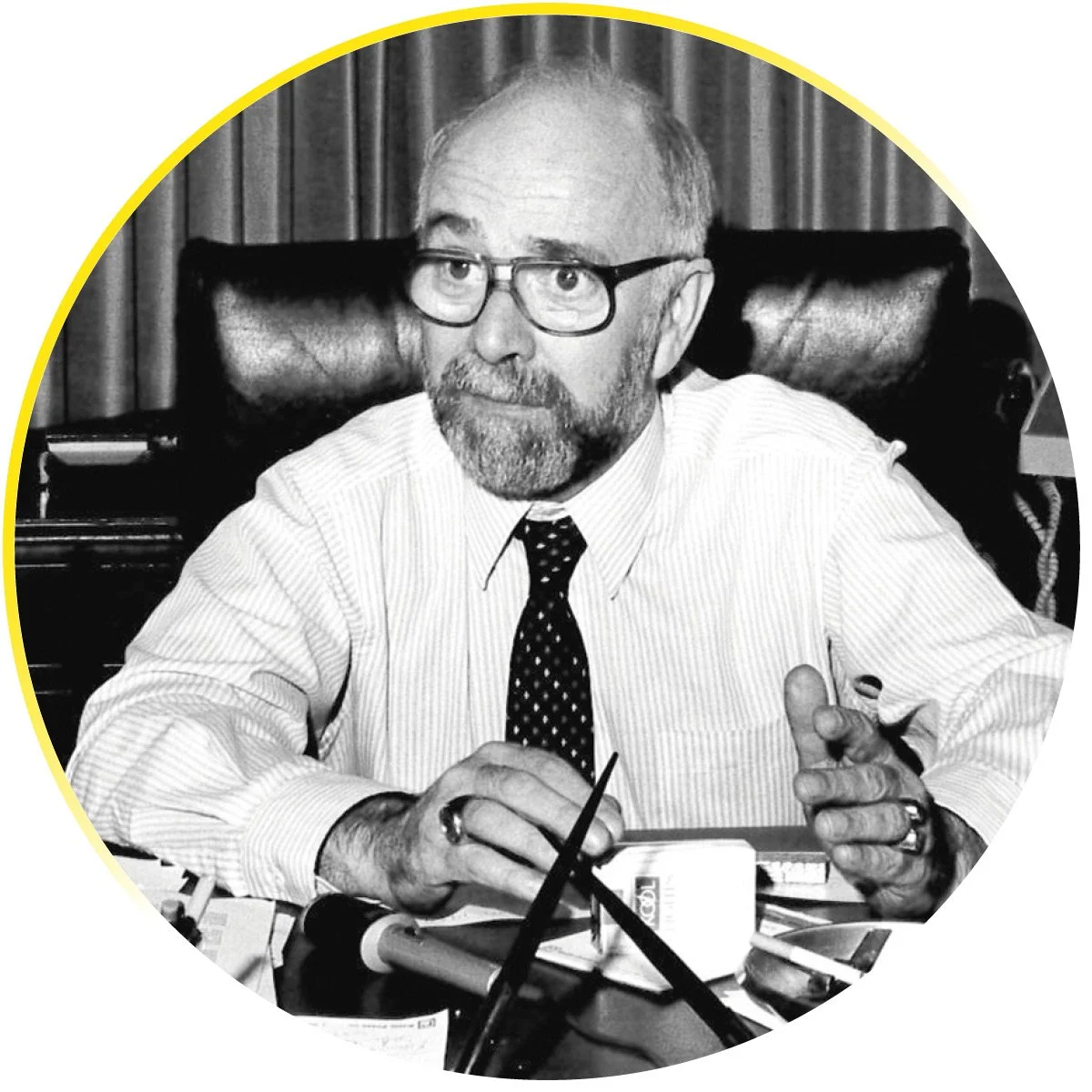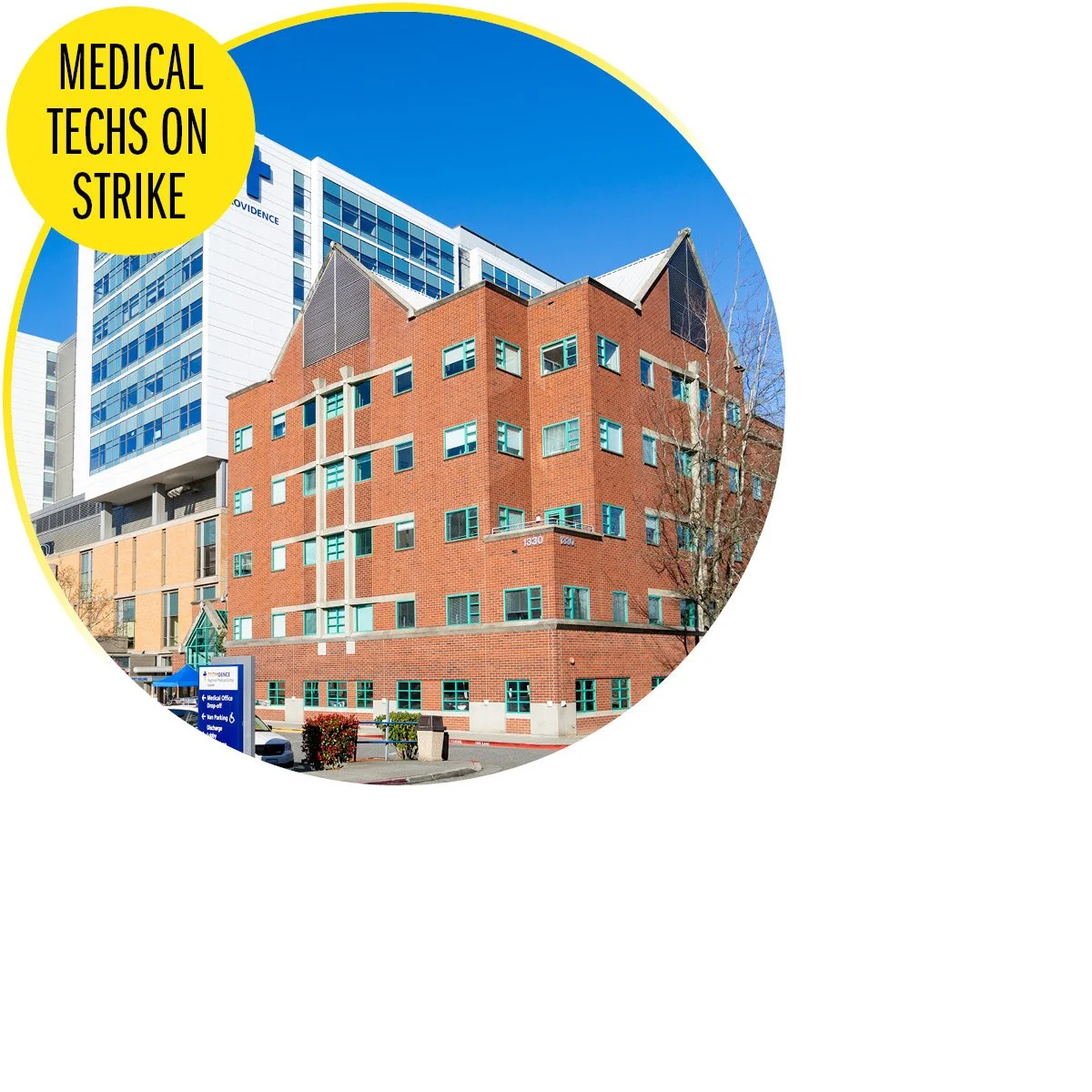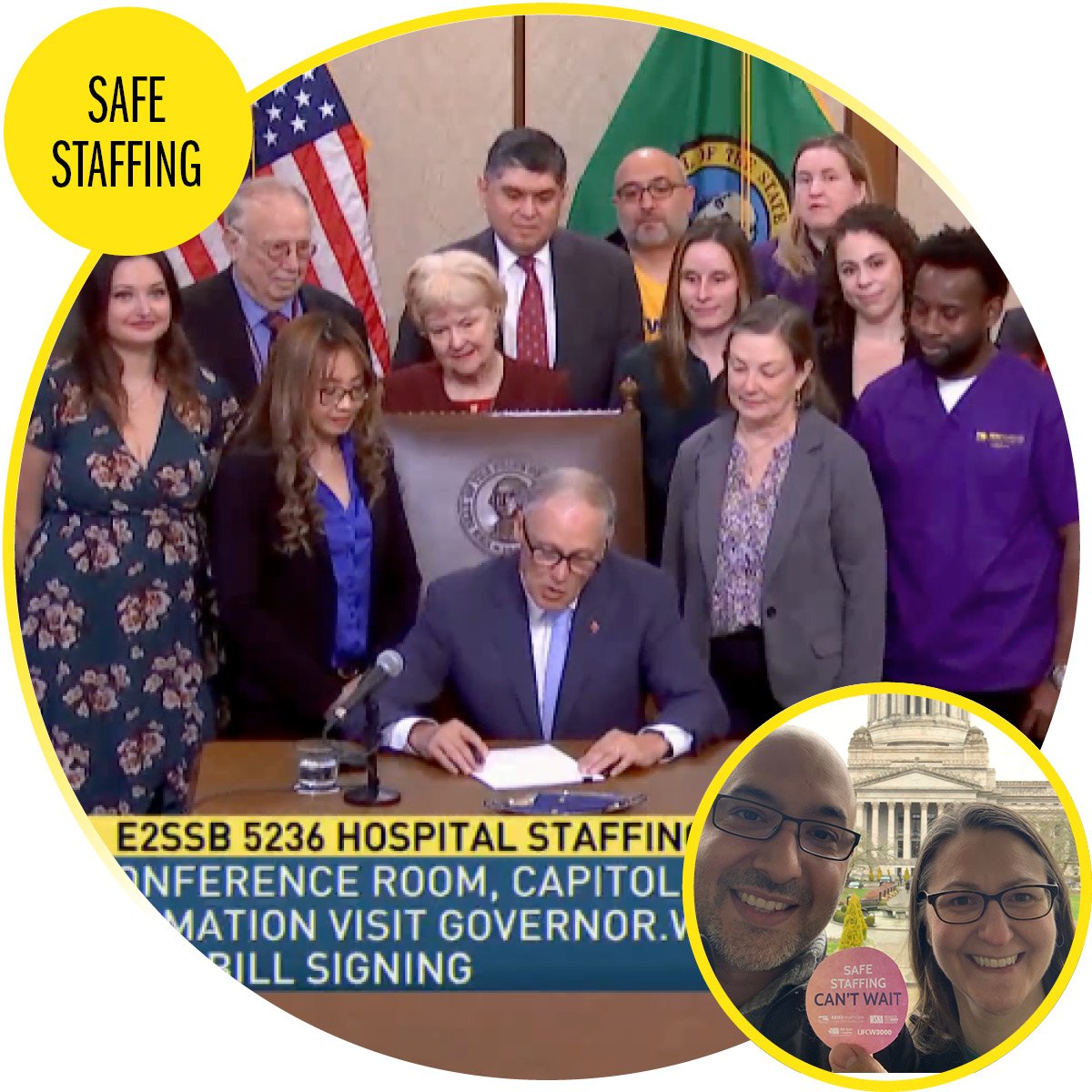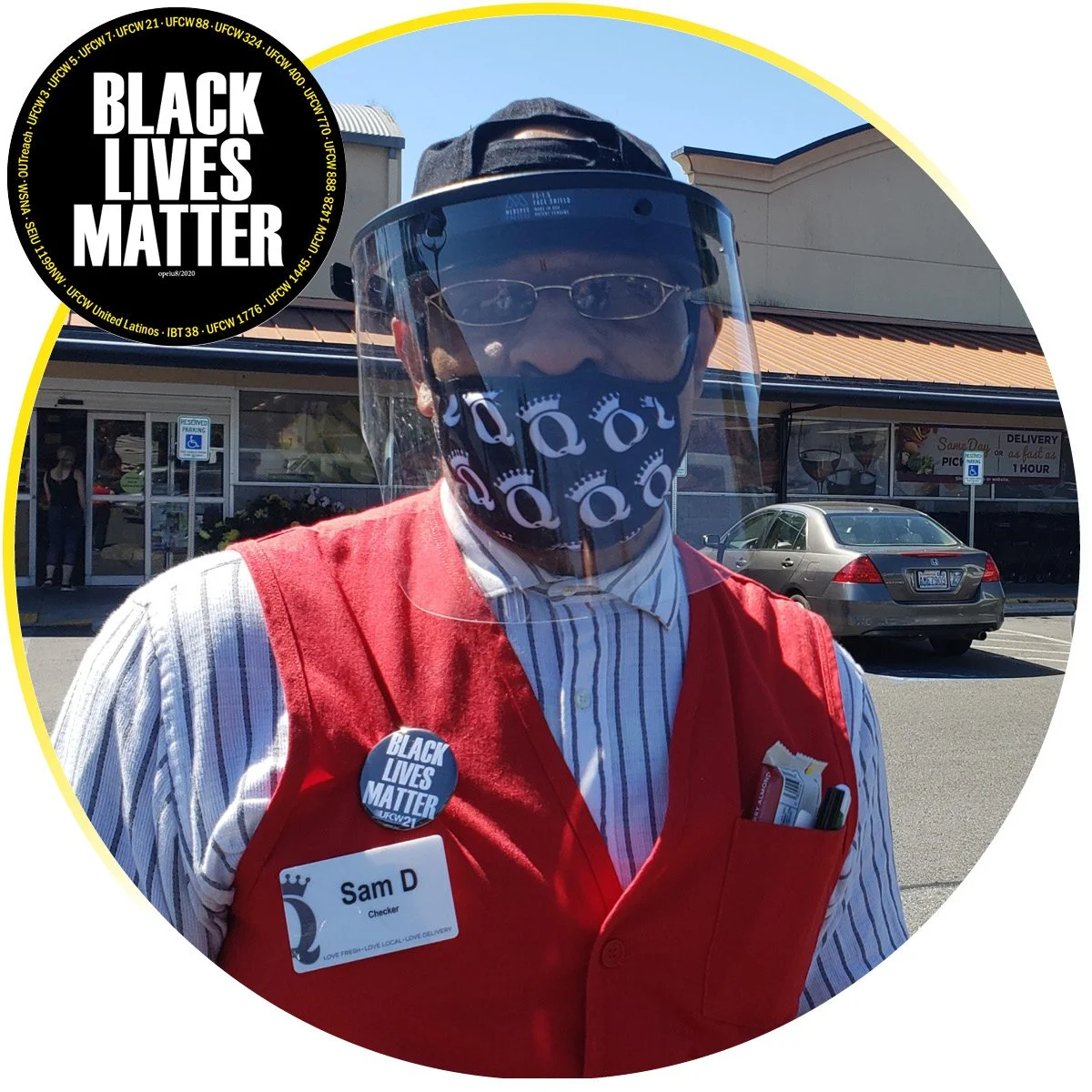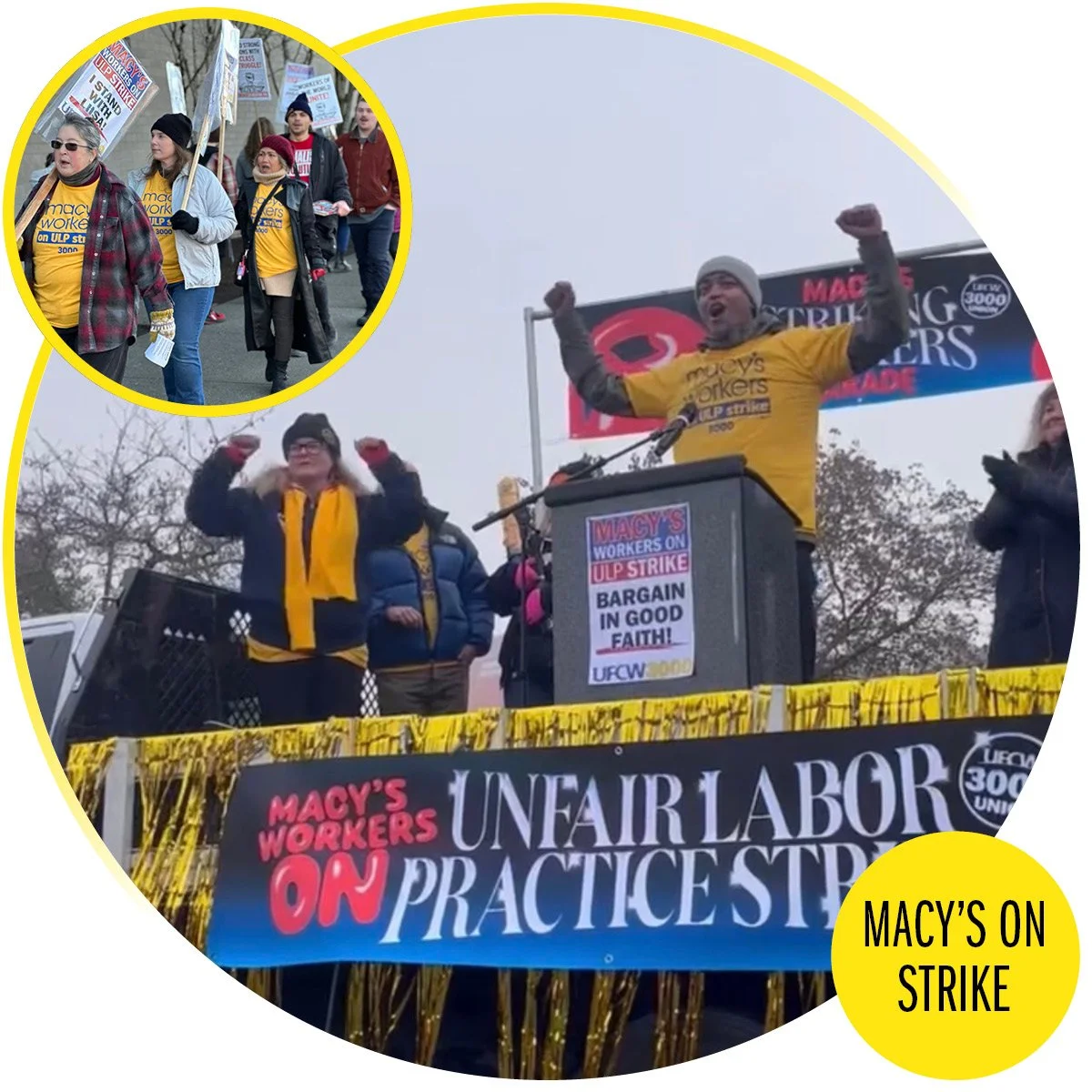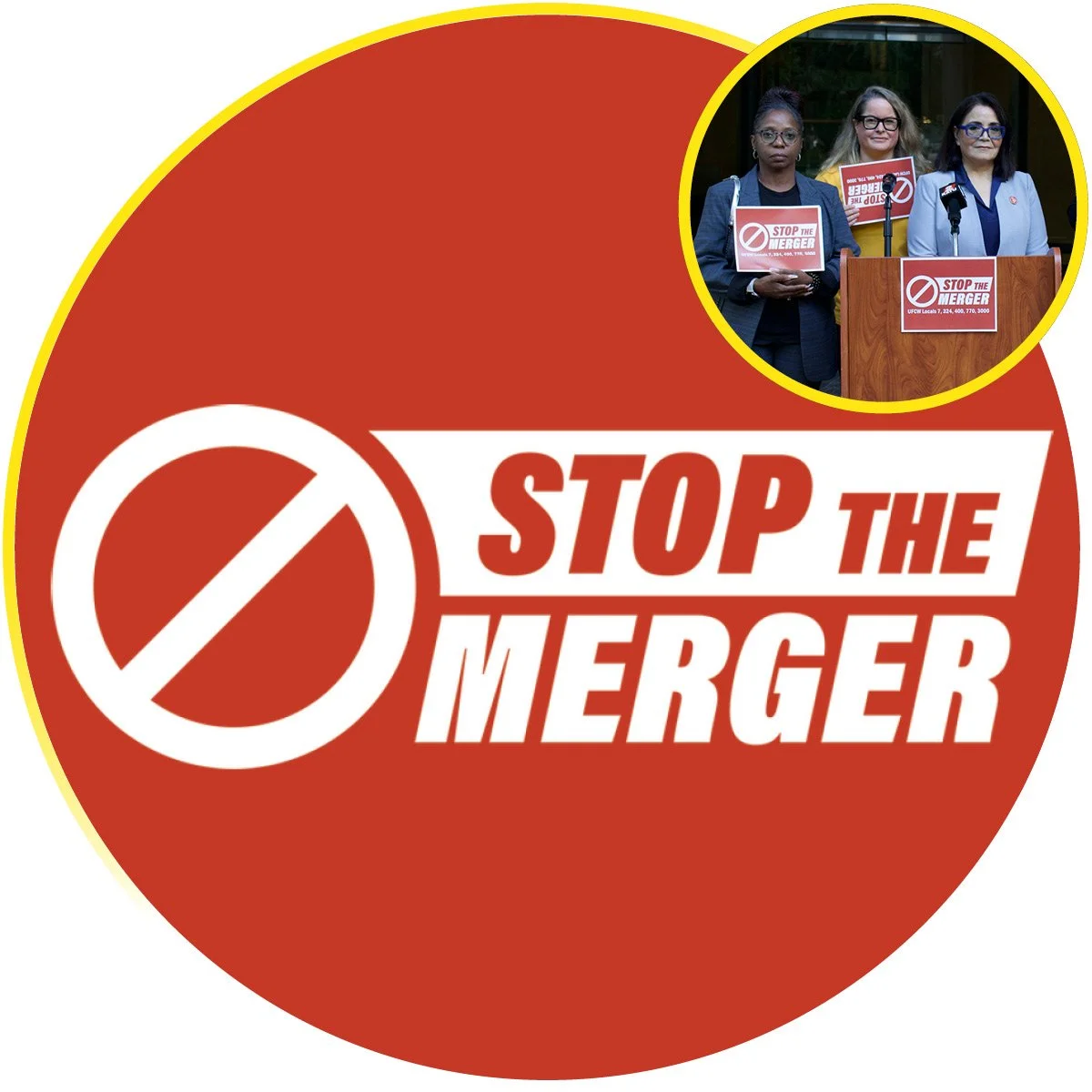UFCW 3000: 125 Years of Solidarity
/Our predecessor unions fought hard for workers over the last century-and-a-quarter.
April 2, 2025 marks UFCW 3000’s quasquicentennial, a word so fancy that nobody quite knows how to say it. Regardless of how you pronounce it, the absurdly Latinate term means we’ve been around for 125 years. During that time, we’ve grown from a crew of nine butchers in downtown Seattle to the largest UFCW local in the country, representing more than 56,000 workers in grocery, retail, food processing, health care, laundry and textiles, cannabis, and others industries.
As you’ll learn from a glance at the timeline below, we did not build that power by writing strongly worded letters or catering to egos. We built it by standing together, working shoulder to shoulder with other unions, pushing lawmakers to pass favorable legislation, and fighting like hell. Some fights—like the battle to unionize packing houses—took decades. Some fights took one good strike. No matter the outcome, the next day’s marching orders were always the same: fight, fight, fight.
That spirit won several benefits many of us take for granted—the 40-hour work week, the 8-hour work day, vacations, a good pension, quality health insurance, and apprenticeship programs that keep our trades alive. And it’s that spirt we need to maintain to stay around for the next 125 years.
The beginning: Local 81
In early 1900, nine Seattle butchers formed the Protective Union of Butchers, Local 81. On April 2 of that year, the union was officially chartered as Local 81 of the Amalgamated Meat Cutters and Butcher Workmen of North America (Amalgamated), making it the oldest retail butcher union in the country.
A union that likes to have fun
In the early days, mandatory weekly meetings included “initiations, music, wine, cigars, speeches, and boxing matches between slaughterhouse and retail shop workers.”
The first benefit: In 1904, Local 81 introduced the Amalgamated Sick and Death Benefit. Sick benefits paid weekly for disability, and death benefits paid a lump sum to the family upon death.
Retail Clerks’ Union
In March of 1900, 2,500 retail workers rallied on 3rd Avenue and Union Street in downtown Seattle for “the largest exclusively labor demonstration ever witnessed in the history of Seattle,” according to Seattle Daily News. Members from 30 unions led by a marching band paraded down the street in celebration of winning more reasonable working hours—closing shops at 6pm and keeping them closed on Sunday.
Laundry Workers Local 24 begins!
In January of 1910, 35 laundry workers, “most of whom were women,” according to the Seattle Daily News, voted to organize a union.
In 1914, laundry workers founded Mutual Laundry Company in Seattle’s Lake Union district. More than 2,000 people attended the dance at the Hippodrome to celebrate a new company wholly owned by organized labor, and the only laundry shop in town guaranteed to pay minimum wage.
The fighting’ 24
1910 STRIKE: Laundry workers in Everett strike, winning a 10% raise after bosses countered with 1% raises.
1913 STRIKE: 150 laundry workers struck for three weeks. They wanted a $7 per week minimum wage and an end to a split-shift system where bosses forced laundry workers to remain on the job site without pay.
1917 STRIKE: In early June, 900 women laundry workers and laundry drivers struck for wage increases and an 8-hour day. After a week on the line, 600 more workers joined the union. On July 11, the strike settled, winning union recognition and better wages.
1919 Seattle GENERAL STRIKE
Our unions joined the general strike initiated by shipyard workers demanding raises after WWI pay freezes. Five days after 65,000 workers walked off the job, pressure from more conservative international unions and local politicians ended the action, though the shipyard workers fought on.
A helping hand during the Great Depression
Rampant market speculation, agricultural oversupply, and bad tariffs sparked the Wall Street crash of 1929, which led to the Great Depression. During this time, the Amalgamated Meat Cutters Local 81 pooled money to help unemployed members survive.
The 1930s saw the rise of chain stores and anti-union trade groups. During this time, Local 81 ramped up political activity to protect our work. For instance, we pushed the Seattle City Council to establish a meat inspection program, allowing “only licensed meatcutters to work in city markets.”
1937 STRIKE: Packinghouse Union Local 186
After three decades of fighting for recognition, more than 1,000 Seattle-area workers at four packing houses walked off the job in December. Many more workers in the region held sympathy strikes, creating a meat shortage. The strike won a 7.5-cent raise, a 40-hour work week, a requirement that new employees must join the union in two weeks, and “the hiring of workers through union headquarters,” according to the Seattle Daily News.
The Packing House Union would eventually merge with the Amalgamated Meat Cutters.
Equal pay for equal work
In a 1943 arbitration case, our Retail Food & Drug Clerks Union Local 1105 won equal pay for women replacing men called to WWII, effectively ending the pay differential between journeypersons.
First union in WA to strike for five days and forty hours
In March of 1946, the Amalgamated Meat Cutters voted to limit a week’s work to 40 hours, Monday through Saturday, and then immediately kicked off a strike. We won the objective in less than a week, as well as a second week of vacation.
As labor shortages during WWII brought more women into the workforce, Francis Kennedy took up the saw and cleaver as Local 81’s first sister. The meat-cutting industry had a long history of excluding women and minorities, and Kennedy played an important role in fighting discrimination from within the labor movement.
In May of 1946, the Seattle Meatcutter’s Apprenticeship was established. A few years later, in 1949, the City of Seattle required all apprentices to earn their licenses at that school. The move improved product and created a pipeline of skilled workers.
A particularly good round of bargaining
In the 1950s, Local 81’s power peaked after mergers with the deli workers, the fish workers union, and the fur and leather union. This new muscle enabled major contract victories in 1959, including the pension, sick leave (on the fourth day of illness), and a third week of vacation. Wages rose to $112 per week and $95 per week for wrappers.
Unions crush union-busting Initiatives 198 and 202: In an attempt to break the backs of unions, in 1956 big business and big banks funded I-198, a “right-to-work” initiative. Thanks to our union and others, the initiative failed 68% to 32%. Two years later, they tried again with I-202. That initiative failed, 64% to 36%.
Our health care trust is born
In 1955, the Amalgamated Meat Cutters and the Retail Dealers created the Health & Welfare Trust and Plan.
Grocery workers hold the line on parity, win health insurance: Seeking to restore unequal pay for women, in 1955 contract negotiations grocery companies pit men and women workers against one another by offering men higher raises than women; 10 and 5 cents, respectively. After more than 2,000 grocery workers with Local 1105 threatened to strike, the two sides settled on 7.5-cent raises for journeymen and journeywomen. Two years later, in 1957, Local 1105 threatened to strike again and won 20-cent raises for journeypersons, plus the new health and welfare benefit.
Pharmacists split to form own union
In May of 1958, Pharmacists & Retail Drug Store Employees Union Local 330 forms, moving 1,000 workers from Retail Food & Drug Clerk’s Union 1105 to the Retail Clerks’ International Association. The union developed a reputation of being “tough but fair,” according to the Seattle Daily News. By 1975, our union would grow to represent more than 2,000 workers in drug stores and hospitals.
Pharmacists’ first strike: In December of 1964, our union struck 325 drug stores in Puget Sound for 13 days. The action won wage increases and increased pension fund contributions.
Grocery chains discover solidarity
The 1960s brought the rise of Allied Employers, Inc. They started coordinating bargaining, and stores started expanding hours.
1964 STRIKE: The action by Amalgamated Meat Cutters Local 81 led to a contract that protected the 40-hour work week and added companywide seniority language.
1967 STRIKE: As a result of the strike, Local 81 negotiated a contract that prevented grocery stores from undercutting journeyperson meatcutters. This year we also won a fourth week of vacation, funeral leave, and non-discrimination clause to the contract.
A helping (farm) hand
In October of 1968, United Farm Workers members struck grape vineyards in California. Supporters around the country helped organize a consumer grape boycott. Those organizing in Seattle included Danny Gamez, an 18-year-old harvest hand who worked in the vineyards of the Coachella Valley. His wife was pregnant, and Retail Store Employe’s Union [sic] Local 1001 was “underwriting” her maternity bills.
UFCW is born
UFCW is born: In 1979, the Amalgamated Meat Cutters merged with Retail Clerks International Union to form UFCW, creating the largest union in the AFL-CIO. Local 81 was the only Amalgamated local to vote against this merger.
“The labor movement started as the conscience of this nation”
Those were the words of Bill Olwell, a 33-year-old former grocery clerk elected as president of the Retail Store Employees Local 1001 in August of 1968 and president of the King County Labor Council. At that time, Local 1001 represented 7,000 members and the KCLC boasted 65,000. He “espoused a philosophy which envisions the labor movement reaching well beyond the bargaining table,” according to the Seattle Daily Times. He also had “no hesitation in expressing concern over the economic plight of minorities, the elderly, working mothers, juvenile delinquency and education,” and he wanted contracts to “fund a man into retirement” by reducing the work week for people when they hit 60 until they retire at 65.
During negotiations in 1972, he coordinated bargaining with dozens of labor unions with the goal of winning higher wages, sick leave improvements, guaranteed hours of work, a pension plan jointly managed by union and management (instead of just management), health care for retired employees, a “pregnancy benefit,” cost-of-living raises, and three more holidays. The union ended up taking a much worse deal; the pension plan, the cost-of-living clause, and the sick leave flopped, but they scored 20-cent raises and better health care, including a pregnancy benefit. We did hold the line on Sunday closures, though. And he’d later help end wage discrimination against women in high-end department stores.
He'd go on to serve as the international’s vice president, and he was instrumental in merging the Retail Clerks with the Meat Cutters to form UFCW. Throughout all of that, his rivals “frequently and viciously” attacked him for being gay. He died in 2001, survived by his partner of 35 years, Eddie Miller.
Our health care story begins
In 1974, Congress granted health care workers in nonprofit hospitals the right to collectively bargain, adding protections for 1.5 million people
In July of 1976, Northwest Economic Council chartered as Local 900, affiliated with the Retail Clerks Union. At that time, the union had 350 members at three hospitals and was seeking contracts at five more locations. Local 900 was the “first union for medical workers such as X-ray technicians and surgical assistants,” according to the 1994 obituary of Elliott Willman, who helped create the local.
Health care workers, unite! As nurses struck 15 of 18 Seattle-area hospitals in 1976, lab techs belonging to the Northwest Economic Council joined forces to strike or threaten strikes at the same institutions. We fought Providence, Group Health, Swedish and others for better wages and safer staffing.
Always be organizing
Despite an increasingly tough political environment for labor in the mid 1980s, Local 1001 Executive Vice President Elliott Willman, a former surgeon’s assistant at Group Health and co-founder of the Northwest Economic Council, abided by one philosophy: organize, organize, organize. Our union pushed to organize workplaces two, three, or four times—and we found success. “He has run 60 to 70 organizing efforts in Western Washington during the past 12 years, and in most, he has come out the winner, organizing nearly 3,000 workers, including 900 new members added to the ranks of his own union this past year,” the Seattle Times reported.
Tony Abeyta to the rescue
After a tough decade of concessionary contracts, Amalgamated Meat Cutters Local 81 union elected Tony Abeyta as president in 1988. Abeyta was a Safeway meat cutter and a Latino labor leader. He vowed to unify the officers, end concessionary bargaining, oppose a merger with the clerks (but still work with them), and coordinate bargaining with other locals to build power.
A satisfying STRIKE: In 1989, Local 81 held an 81-day strike against Food Giant and fended off a lockout from Allied in King County. The action kept Sunday premiums intact, though Local 81 traded reducing Sunday pay to time-and-a-half for higher pension contributions and hard-money wage increases (rather than lump-sum bonuses)
A decade of early settlements: Throughout the 1990s, Local 81 settled early while making major gains in pension, health care benefits, and wages. In 1998, an early retirement program allowed members to tap out with full pensions once age plus years of experience added up to 85.
First strike at Providence in Everett
On May 4, 2000, 800 technical and service workers in multiple unions, including UFCW Local 1001, walked out of Providence Everett Medical Center to fight for annual step and cost-of-living increases, higher pay for weekend and evening work, and a closed shop. The walkout amounted to the first strike in the hospital’s 100-year history.
Alphabet Soup
As company mergers increased in the 1990s and early 2000s, unions merged in response. By 2005, Northwest Economic Council 900 and the laundry and textile workers merged into UFCW 1001.
In 2005, retail clerk unions 1001 and 1105 plus UFCW 381 merged to form UFCW 21. Four years later, UFCW 44 merged into UFCW 21.
In 2011, UFCW 81, the meat cutters, merged into UFCW 21. And in 2012, UFCW 141, which represented staff nurses, merged into UFCW 21.
Longest grocery store strike in US history
Heading into the millennium, corporations were bound and determined to cut worker health care to save on labor costs. Enter: The 2003 SoCal Strike. Tens of thousands of workers struck for four-months. The results introduced the “two-tiered” system, which allowed stores to pay new hires less than veterans, but the contract saved our health care and pension. Up in the Pacific Northwest, strong solidarity between Locals 81, 1105, 44, and Teamsters Local 38 (which represented grocery clerks in Snohomish) deflected the worst of the concessions.
First major union to endorse marriage equality bill
In 2011, UFCW 21’s executive board voted to endorse marriage equality. In previous years, our union helped build the coalition to Approve Referendum 71, which legalized domestic partnerships, and we also won same-sex partner rights in our contracts.
A higher minimum wage and “Sick and Safe” leave
When employers refuse to raise wages and increase benefits, we take the fight to the ballot box. One prime example: In 2016, our union fought hard to champion and pass Initiative 1433, which raised the statewide minimum wage to $13.50 and guaranteed seven days off for workers to take care of sick loved ones or victims of domestic abuse. The law took effect on Jan 1, 2018.
Winning WA’s first recreational cannabis retailer contract
On August 24, 2018, UFCW 21 held a signing ceremony to celebrate the ratification of the state’s first cannabis contract, which covered 134 workers at Have a Heart, a retail operation with shops in Belltown, Bothell, Greenwood, Skyway and Ocean Shores.
The contract delivered "above-average compensation for the industry, comprehensive health and welfare coverage and other benefits, including trainings, mentoring programs and staff-development opportunities,” according to our press release.
Organizing Have a Heart went smoothly. “This relationship is quite unusual in a very positive sense,” UFCW Local 21 President Todd Crosby said at the time. “It’s rare for an employer and their employees to reach a first contract so quickly and one that is so promising for its current and future employees.”
Not all cannabis retailers and sectors of the cannabis industry proved so willing to support the needs of their workers and communities. That’s why our union still tirelessly organizes shops, and why we’re fighting in Olympia for HB 1141, a proposal that would allow cannabis agricultural workers to form unions under state law.
The Pandemic
When a novel coronavirus reached our shores in 2020, the whole world shut down – with a few key exceptions. Governments and communities kept grocery stores and hospitals open, and they dubbed the workers who operated those institutions “essential.” Though we appreciated the recognition, we didn’t expect any handouts, so our union immediately sprang into action.
As employers distributed improper personal protective equipment (PPE), we ran a PPE drive to ensure grocery and health care workers had the protection we needed.
As we watched our co-workers contract a deadly respiratory infection in the midst of a relatively slow vaccine rollout, we fought hard for the hazard pay we needed to survive, winning a temporary $4 raise in Seattle and a $5 bump in Burien.
As QFC worker Hilary T.T. Williamson put it at the time: “Hazard pay is needed for grocery workers. We work around the public every day, risking our health to feed our families. I am a single mother of 2 small children that are at risk because I am at risk. I struggle to pay my babysitter, who basically raises my children because I am working 40+ hours just to barely survive, on top of risking not only my health but my children’s health. Kroger is making massive increases in profit while I barely scrape by.”
UFCW 3000 is born
In December of 2021, the boards of directors at UFCW 21 and UFCW 1439 approved a merger to form the largest private sector union in Washington state. Partly due to frustration with restrictions on local number-naming conventions, as a joke our union added “Local 3000” to a list of several possible options we’d accept. The number caught on. Our executive board wanted to celebrate the creation of a new, future-forward union. And, after all, we were the largest local in Washington, so it just made sense to have the largest number. The merger went into effect on March 1, 2022, and so we became UFCW 3000.
Safe nurse staffing bill signed into law
On April 21, 2023, Governor Jay Inslee signed the safe staffing bill that included accountability for employers. “Nurses can no longer stand by and take these unsafe assignments, come to work and be physically, mentally, emotionally abused,” said Kristen Crowder, labor & delivery RN at Providence Everett.
The legislation only passed thanks to the diligence of rank-and-file members with the WA Safe and Healthy Coalition, a collaboration between the state’s three largest health care unions: UFCW 3000, SEIU 1199NW, and WSNA.
Black Lives Matter
An administrative judge sided with UFCW 3000 in May of 2023 in our case against Fred Meyer and QFC, who prohibited workers from wearing Black Lives Matter pins at work. The judge ruled that wearing the pins counted as concerted activity. “By collectively displaying the ‘Black Lives Matter’ message on their work uniforms, the employees in this case acted to advance their interest—as employees—to an affirmatively anti-racist, pro-civil rights, and pro-justice workplace,” she wrote.
Nurses STRIKE Providence Regional Medical Center
On Nov 14, 2023, more than 1,300 nurses launched an unfair labor practice strike against Providence to ensure better staffing levels for the safety of health care workers and patients, as well as for transparency and accountability measures meant to renew community trust in the local hospital.
“If nurses have to be on the outside rather than at the bedside, then you know something’s wrong, and we have to fix this for the long-term,” said Faye Guenther, UFCW 3000 president.
“Nurses take our job of caring for this community extremely seriously,” added Juan Stout, emergency department nurse at Providence Everett, union bargaining team member, and executive board member of UFCW 3000. “We see you and your families through some of the most difficult moments of your lives… We have to take a stand for our patients.”
Retail workers STRIKE Macy’s twice
During bargaining in 2023, Macy’s attempted to eliminate MLK Day as a holiday, scrap our hard-won wage scale and replace it with lowball raises, and they were offering no clarity on store safety policy as bosses disciplined workers for calling security when they suspected theft.
Amid all that, our union launched two unfair labor practice strikes. First, we struck over Black Friday weekend in 2023, forcing the store to slash its holiday shopping hours at the peak of the season and calling attention to the way our work ensures the company’s success. When that wasn’t enough, we struck the Alderwood location for nine days in freezing weather and called for a Macy’s boycott. We ended up winning a best-in-the-nation contract that protected our rights and directly addressed our top concerns.
Medical Techs STRIKE Providence Sacred Heart
After working through the COVID-19 pandemic, enduring years of short-staffing and endless hours on-call for the sake of our patients as Providence raked in profits, nearly 500 technical workers walked off the job on April 22, 2024.
“Sacred Heart offers services that no one else in the region offers, yet Providence does not seem to care about the skill set needed to provide those services,” said Pediatric Sonographer Mark Kehoe. “I have observed several coworkers leave for more money in the same or lower-priced areas of the county and have indicated that they have a better work/life balance. Providence does not seem to care about these things. Without these adjustments, recruiting to fill vacancies is difficult if not impossible.”
The union of mega-merger slayers
In October of 2022, Kroger and Albertsons announced without warning a $26 billion merger that we knew would cut pay, close stores, and devastate our communities. The day after we caught word, our union joined forces with UFCW 7, 324, 367, 770, and Teamsters Local 38 to stop that merger in its tracks. Our unions fought for two years, enlisting workers, customers, the Federal Trade Commission, and elected officials at every level of government in an effort to block this mega-merger.
On December 10, 2024, a King County judge ruled the merger unlawful. The next day, Kroger and Albertsons withdrew from the agreement and sued each other in retreat.

















